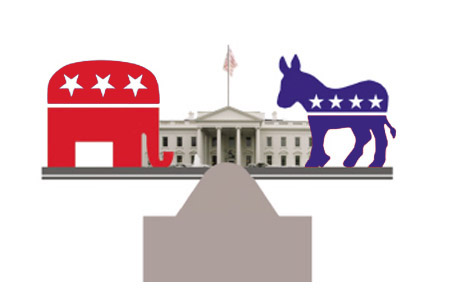So anyway, you can see obviously, a year wasn't very good for the democrats
不過很明顯的是88年是民主黨出師非常不利的一年
Back to when Jimmy Carter won against Ford
來看卡特在大選中戰(zhàn)勝福特那年
it's a east-west split almost, right? with the democrats Carter another southerner taking the southeast except for Virginia very clearly
選情看起來東西兩分,民主黨人卡特又是一位拿下了東南部的南方人,除了弗吉尼亞例外地泛紅
With Ford taking the west almost entirely
同時(shí)福特也幾乎拿下了整個(gè)西部
and then the northeast, the upper great lakes split. At least at the state level, so a little bit complicated when we look at counties
還有東北部,和大湖區(qū)。至少從州級看來,情況是這樣的相比之下,縣級的選情會(huì)顯得較為復(fù)雜
That wasn't that long. I guess I'm old enough it doesn't seem that long ago to me but we see a very different geography
這場選舉其實(shí)也就是30年前的事。至少對我這個(gè)年齡的人來說它仍記憶猶新,但如今選情的分布卻已十分不同

And I have to ask if anybody knows why you have a vote for Ronald Reagan coming from Washington? ever heard faithless elector?
我想問,有沒有人知道為什么里根在華盛頓州獲得了一票?你們有沒聽說過存在不忠誠選舉人?
About half of the states have laws that the electors have to vote the way the states vote but the other half don't
大約過半的州都有立法規(guī)定選舉人必須遵循他們州的意愿投票,但也有近半的州沒有這種規(guī)定
Electors can vote for whoever they want basically and so we had a elector from Washington who real like Ronald Reagan and voted for him regardless
選舉人可以投給任一他們心儀的候選人,這種情況下,華盛頓州出現(xiàn)了一位非常青睞里根的選舉人,不顧州的意愿,把票投給了他
If you interested in you can go to Wikipedia see the sates that require them to vote as the state does but not all of them by any means
如果你有興趣,可以上維基百科搜搜哪些州要求選舉人按州的意愿投票,并不是所有州都有這個(gè)規(guī)定
Finally, my last historical map
來看最后一個(gè)年份的地圖
Because I'll be showing this map as we go of course 1896 William Mckinley vs William Jennings Bryan
這幅地圖是肯定要講的1896年麥金利和布萊恩間的角逐
The pattern is pretty much the opposite of what we have today with a few exceptions
當(dāng)時(shí)的格局與如今近乎相反除了一些例外
with Washington having been voting for the Democratic party then and now
例如華盛頓州,從那時(shí)至今都一直堅(jiān)定不移支持民主黨
Kentucky voting for their Republican party then and now and Indiana then and now, North Dakota perhaps
肯塔基州對共和黨也一樣忠誠,還有印第安納州和北達(dá)科他州
but otherwise it's pretty much the inverse
其他州當(dāng)時(shí)的情況則與現(xiàn)在全然相反
Again, the question is have the areas changed have the parties changed or is the bit of both
還是那個(gè)問題,是這些地區(qū)的人變了,還是政黨本身變了?抑或兩者皆而有之?
While in this election William Jennings Bryan was in favor of the common people, The poor people particularly farmers and miners
在這場選舉中,布萊恩受到了普通百姓的支持,如窮人,尤其是農(nóng)民以及礦工
He ran on a platform of inflation. He wanted coinage in silver. His big issue was the gold standard
他將抑制通貨膨脹寫入競選綱領(lǐng)。他希望銀幣能自由鑄造,他最主要的主張就是放棄金本位制
He claimed that the American workers and farmers were being crusified on a cross of gold. They were deeply in debt
他認(rèn)為美國的工人和農(nóng)民會(huì)被釘在黃金的十字架上,他們負(fù)債累累
There was a shortage of gold which meant a deflationary environment and farmers who were deeply in debt couldn't make their payments
因?yàn)辄S金的不足意味著物價(jià)緊縮,負(fù)債沉重的農(nóng)民無法維持生計(jì)
So it's really the election is all about monetary policy which is interesting considering Some of the issues we're facing today
這場大選其實(shí)是一場貨幣政策的較量,考慮到今天我們所面臨的問題,這是很有意思的
Mckinley was the candidate of gold standard of hard money, fiscal conservatism. So, then yeah that seems right
麥金利支持金本位制、黃金與貨幣掛鉤以及緊縮的財(cái)政政策他的政策看起來似乎更合理
Republicans more business-oriented, Democrats on the opposite side
共和黨人迎合了企業(yè)的利益而民主黨人則更注重民生
When you look at the religious issue, it's the opposite
而在宗教問題上,他們的立場又反了過來



